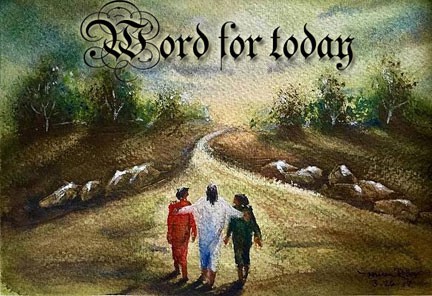Watch
Events
Articles
Market
More
The land that YHWH struck down before the congregation of Israel is a land for livestock, and your servants have livestock.
Numbers 32:4
This says that God struck the land of the Canaanites, but the land remained pleasant and fertile. He struck it so that it turned against its occupants. He owns the cattle and the hills beneath them. Use his resources wisely, because he can turn even your wealth against you.
The destiny of a people is tied to their land. God struck the land of the Canaanites because of their sin and they died. He blessed the land of Israel (the same land!) and the Israelites prospered.



072325 / 27th day of the 4th month 5786
WORD FOR TODAY “you will be judged on your actions”: Eze 24:14 "I, the LORD, have spoken; it is coming and I will act. I will not relent, and I will not pity and I will not be sorry; according to your ways and according to your deeds I will judge you," declares the Lord GOD.'"
WISDOM FOR TODAY: Pro 27:3 A stone is heavy and the sand weighty, But the provocation of a fool is heavier than both of them.
www.BGMCTV.org




Exodus 19:6, “And unto Me you shall be a kingdom of priests and a holy nation.’ These are the words that you are to speak to the Israelites.” The first time in the Bible the Hebrew word for holy appears is this verse. Strong’s #h6918 is defined as; holy, Holy One, holy ones, saints, consecrated. The mixed multitude who received the commandments were being told how to be faithful to our Creator.



Celebrate Erev Shabbath with
Sabbath Keepers Fellowship!
Every Sabbath Eve at 8:30pm Central Time we will host an informal get-together on our YouTube channel to bring-in and honor the seventh-day rest. We will have:
- A short Sabbath eve prayer service
- Greetings to all present
- Highlights of the weekly Torah parasha with some commentary
- Followed by live music and discussion with whomever wishes to bring it.
His yoke is easy and the burden light! Join us for some simple celebration and fellowship to end your week. The entirety of the service should be about 1.5 hours long. If you play an instrument or sing, contact the service admin to join in. If you don’t, just listen as others do their best to honor our Creator on His holy day.
Discover the latest meeting at:



Thought for Today: Wednesday July 23
Have you ever known anyone who has a lot of questions about YHVH and the Bible? No matter how many you answer, they always have more. Our faith can stand up to any questions, but sometimes people ask questions -- and keep asking questions -- just to avoid facing their own spiritual needs and acknowledging Who Yeshua really is. Their questions may only be an excuse to keep from turning their lives over to the Moshiach. Make sure your family and friends know what the Gospel is because many may not really understand it. Never give up hope that someday they will give their lives to Yeshua. And of course, never cease praying for them.


